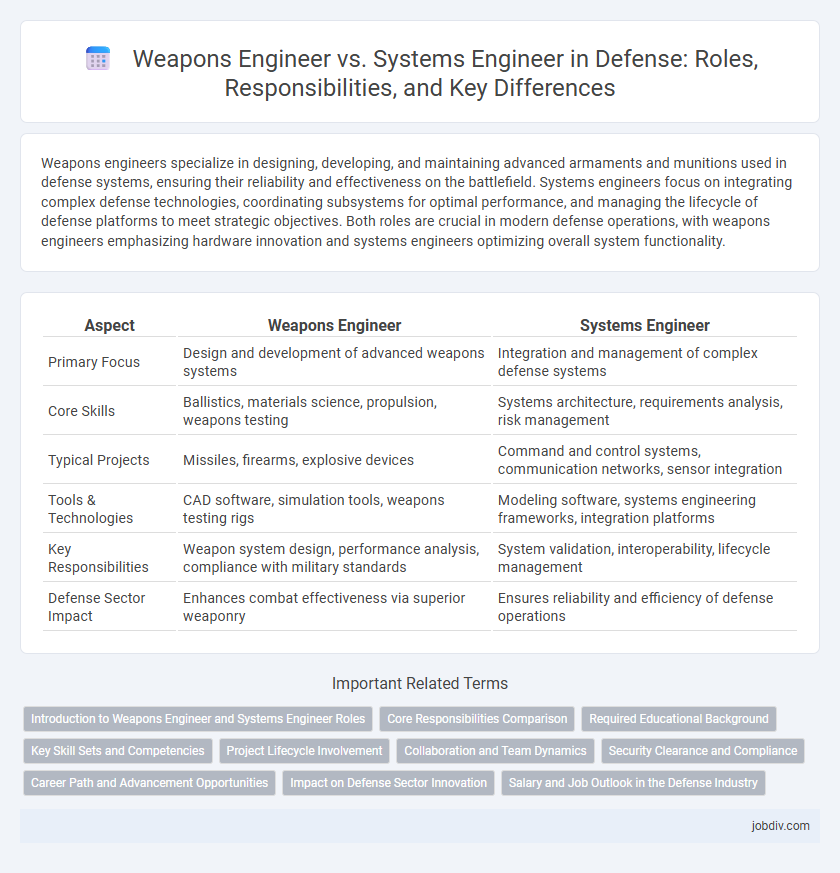Weapons engineers specialize in designing, developing, and maintaining advanced armaments and munitions used in defense systems, ensuring their reliability and effectiveness on the battlefield. Systems engineers focus on integrating complex defense technologies, coordinating subsystems for optimal performance, and managing the lifecycle of defense platforms to meet strategic objectives. Both roles are crucial in modern defense operations, with weapons engineers emphasizing hardware innovation and systems engineers optimizing overall system functionality.
Table of Comparison
| Aspect | Weapons Engineer | Systems Engineer |
|---|---|---|
| Primary Focus | Design and development of advanced weapons systems | Integration and management of complex defense systems |
| Core Skills | Ballistics, materials science, propulsion, weapons testing | Systems architecture, requirements analysis, risk management |
| Typical Projects | Missiles, firearms, explosive devices | Command and control systems, communication networks, sensor integration |
| Tools & Technologies | CAD software, simulation tools, weapons testing rigs | Modeling software, systems engineering frameworks, integration platforms |
| Key Responsibilities | Weapon system design, performance analysis, compliance with military standards | System validation, interoperability, lifecycle management |
| Defense Sector Impact | Enhances combat effectiveness via superior weaponry | Ensures reliability and efficiency of defense operations |
Introduction to Weapons Engineer and Systems Engineer Roles
Weapons Engineers specialize in designing, developing, and testing advanced weaponry and munitions systems to meet defense requirements. Systems Engineers focus on integrating complex defense technologies, ensuring seamless operation and interoperability among hardware, software, and communication systems. Both roles are critical in defense projects, with Weapons Engineers concentrating on armament capabilities and Systems Engineers managing overall system functionality and performance.
Core Responsibilities Comparison
Weapons Engineers specialize in designing, developing, and testing advanced weaponry, focusing on ballistics, explosive materials, and weapon system integration to enhance combat effectiveness. Systems Engineers concentrate on the overall architecture, integration, and performance of defense systems, ensuring interoperability, reliability, and compliance with military specifications across various subsystems. While Weapons Engineers drive innovation in armament technologies, Systems Engineers oversee the holistic functionality and system lifecycle management within defense projects.
Required Educational Background
Weapons Engineers typically require a specialized degree in mechanical, aerospace, or electrical engineering with advanced coursework in ballistics and materials science. Systems Engineers often possess a background in systems engineering, industrial engineering, or computer science, emphasizing systems integration, modeling, and project management. Both roles benefit from security clearances and familiarity with defense industry standards such as MIL-STD.
Key Skill Sets and Competencies
Weapons Engineers specialize in the design, development, and testing of advanced weaponry, requiring strong expertise in ballistics, materials science, and mechanical engineering. Systems Engineers focus on integrating complex defense systems, emphasizing proficiency in systems architecture, requirements analysis, and project management. Both roles demand problem-solving abilities, but Weapons Engineers prioritize precision engineering, whereas Systems Engineers excel in interdisciplinary coordination and lifecycle management.
Project Lifecycle Involvement
Weapons engineers typically engage in the design, development, and testing phases of the project lifecycle, ensuring that weapon systems meet specified performance and safety standards. Systems engineers oversee the entire project lifecycle, integrating subsystems and managing requirements to maintain system functionality and reliability from concept through deployment and maintenance. Their collaboration ensures seamless transitions between design, integration, and operational phases, optimizing project outcomes in defense applications.
Collaboration and Team Dynamics
Weapons Engineers and Systems Engineers collaborate closely to integrate advanced weaponry with complex defense systems, ensuring operational effectiveness and reliability. Weapons Engineers focus on designing, testing, and refining armaments, while Systems Engineers coordinate subsystems to optimize overall performance and interoperability. Their teamwork enhances mission success by combining specialized expertise with holistic system management in defense project development.
Security Clearance and Compliance
Weapons engineers typically require top-secret or higher security clearances due to their direct involvement with classified munitions technology and weapon design, ensuring strict adherence to Department of Defense (DoD) compliance standards. Systems engineers focus on integrating complex defense systems, often necessitating similar clearance levels but with an emphasis on compliance with cybersecurity frameworks such as NIST SP 800-171 and International Traffic in Arms Regulations (ITAR). Both roles demand rigorous background checks and ongoing compliance training to maintain access to sensitive defense information and safeguard national security assets.
Career Path and Advancement Opportunities
Weapons Engineers specialize in designing and testing advanced armaments, advancing through roles such as senior weapons designer and project lead, often requiring deep expertise in ballistics and materials science. Systems Engineers concentrate on integrating complex defense systems, progressing toward systems architect or program manager positions, leveraging skills in systems integration and lifecycle management. Career advancement for Weapons Engineers typically hinges on technical innovation, while Systems Engineers benefit from interdisciplinary coordination and strategic planning abilities.
Impact on Defense Sector Innovation
Weapons engineers specialize in designing and testing advanced armaments, directly driving technological breakthroughs in offensive and defensive military capabilities. Systems engineers integrate complex defense technologies, ensuring seamless functionality and operational readiness across diverse platforms, which is critical for modern warfare efficacy. Their combined expertise accelerates defense sector innovation by enabling the development of sophisticated, reliable, and adaptable military systems.
Salary and Job Outlook in the Defense Industry
Weapons Engineers in the defense industry typically earn an average salary ranging from $85,000 to $120,000 annually, reflecting their specialized expertise in designing and developing advanced armaments. Systems Engineers often have a broader role, with salaries between $90,000 and $130,000, driven by their responsibility to integrate complex defense systems and ensure operational efficiency. Job outlook for both positions remains strong, with projected growth rates of 5-7% over the next decade due to increasing defense budgets and technological advancements in military hardware.
Weapons Engineer vs Systems Engineer Infographic

 jobdiv.com
jobdiv.com